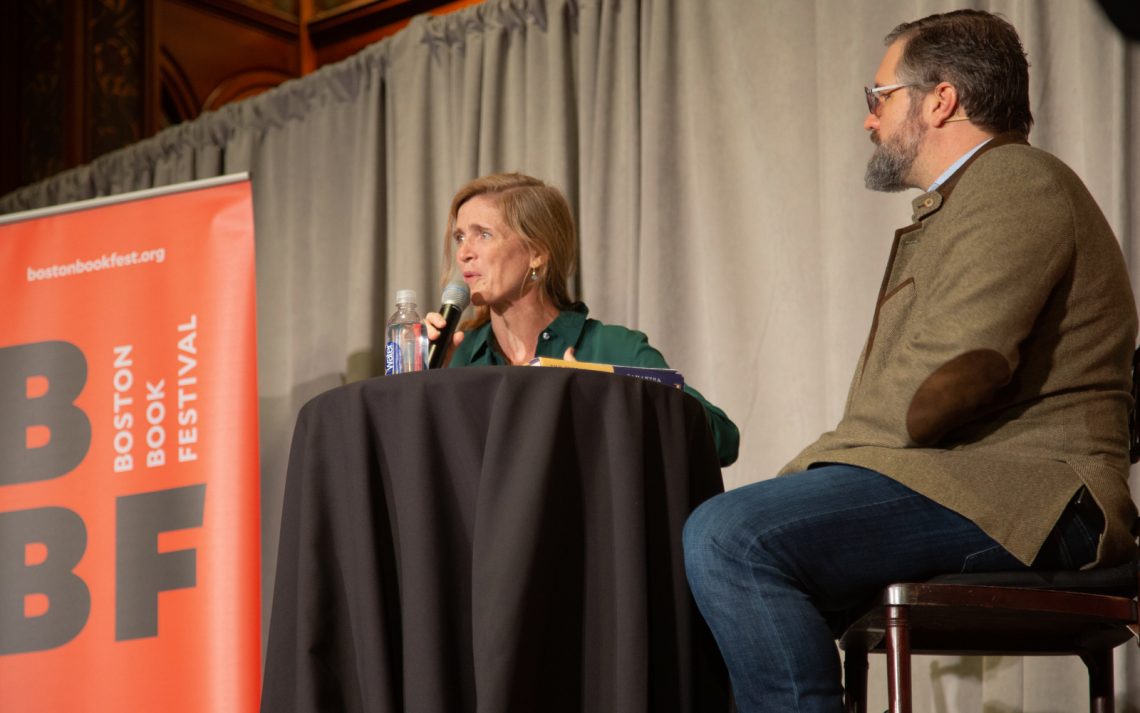By Mariana Sánchez Gaona
BU News Service
The Boston Book Festival kicked off with former U.S. ambassador to the United Nations Samantha Power. She centered the discussion on anecdotes interlinked with her time as a public servant during the Obama administration. The former war correspondent said America’s credibility as a world leader will be the hardest thing to rebuild after the Trump administration.
“What used to be a kind of truism among Republicans and Democrats, it’s good to have allies. And U.S. security embedded in a network of alliances is beneficial for the United States,” Power said on Friday night. “It’s kind of life 101, it’s better to have friends than being completely on your own when you have a problem.”
Power wondered aloud at how any future president could offer the assurance that an agreement, like the Iran nuclear deal, won’t be undone by the time a new administration takes over. The world will question the value of America’s word, she said during the keynote session on her memoir “The Education of an Idealist.”
Power, a human rights activist, believes that President Trump’s constant accusations of free-riding toward U.S. allies and praising regimes like North Korea leaves the country in bad standing to form coalitions in the future.
She exemplified her point on how global cooperation is necessary by explaining the response to the Ebola outbreak in 2014. Power went with an international delegation into the eye of the storm of the epidemic in West Africa at a time when epidemiologists predicted 1.4 million deaths. In response, Donald Trump, who was just a businessman and reality TV personality at the time, stoked fears by tweeting about closing borders and barring U.S. health professionals who helped contain the epidemic on the ground from entering the country.
Although the 2014 outbreak was contained, there is currently an Ebola outbreak in the Democratic Republic of the Congo. When the first cases were reported in 2018, the U.S. left it to Europe to take the lead in dealing with the disease. The World Health Organization declared the epidemic a global health emergency last July. And now, the U.S. response has been limited to technical and financial support.
“The Education of an Idealist” not only touches upon geopolitical matters, but also on personal issues like Power’s anxiety after coming home from reporting the war in Bosnia. A different type of anxiety revealed itself when she started working in government. She battled a sense of inadequacy thinking her experience was not good enough for her job as a public servant.
“Most women in the room will not at all be surprised that you can reach a certain level, your books could be well received, you could be a Harvard professor and then you show up in a new environment and not [feel] sure you belong,” Power said to the almost full Old South Church.

“It’s a pretty familiar feeling. That form of anxiety can be very debilitating in the sense that you can silence yourself,” Power said. She recounted how she felt marginalized in a male-dominated environment being five months pregnant and unsure if her insecurities were all in her head.
One day a female senior director in the administration gathered the other few women working at the time in her office for a glass of wine and asked how they were doing. The Harvard Law professor noticed similar frustrations in the other women. She understood that everybody felt a similar degree of inadequacy for the job, even perhaps her male colleagues, but for their own reasons. The solidarity she found in the meeting encouraged her to go forward.
Even so, she recognizes that this anxiety helped her be more prepared in dealing with foreign representatives. Whether she had to negotiate with the Russian ambassador or try to get China to do something they were reticent about, she wanted to read everything on the subject and know every possible angle people might bring to the table.
Towards the end of the talk, she opened up about when in her confirmation hearing for U.S. ambassador she was questioned on her 2003 article for the New Republic where she wrote that the country should apologize for “crimes committed, sponsored or permitted by the United States.”
She told the audience that Senator Marco Rubio (R-Florida) asked her what crimes America should apologize for? And her answer was “I love America… I would never apologize for America.” Power admitted this answer was unbecoming and not a good one, but she viewed it as a necessary measure to get through her confirmation.
Power said that much of geopolitics is about human interaction, and you cannot “blow past the fact that we made mistakes and pretend people haven’t noticed we have invaded their country and tortured their citizens. How would that work in your life?”
Heather Kitt, an audience member from the U.K., found Power’s candidness encouraging.
“It’s always really inspiring to hear someone be so real and so honest about how they feel about the world, about themselves and their place in it,” Kitt said.
Jeff Finkleman, a 37-year-old attendee, said he liked knowing about how it was to work in the Obama administration. “You do sort of put people who are in these positions of power on a pedestal and kind of think of them as being so different from you,” he said. That’s why he found surprising that Power faced feelings of inadequacy in her job despite her experience because it is something everybody faces.
Power hopes her memoir, which expands from her childhood in Ireland until the end of her tenure as ambassador, will encourage activism and spirit of service. “At a time where there’s a lot of dispair whether any of us can make a difference, I wanted to show a path,” she said. “My goal was for everyone who read it feel less small next to the scale of the problems that surround us and we are bombarded by.”





